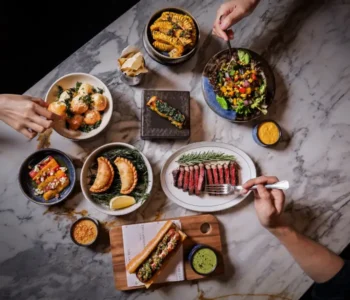
A seasoned skipper both at sea and of global politics, German Ambassador to Indonesia, H.E. Peter Schoof talks to NOW! Jakarta about his current duties, Germany’s significant sustainability contribution in Indonesia and other bilateral issues to address.
Dr. Schoof, you have served Brussels, Damascus, Geneva and Athens. How does being in Indonesia compare to your previous experiences?
If you look at my professional CV and you put years behind each duty station, you will see that Europe was the focus of my career—I served for almost nine years on two occasions in Brussels at our EU mission, I served ambassador in Athens, I served for eight years in the ministry; last post being Director General for European Affairs. Since 1997 to 2017, I have been serving almost 20 years in Europe.
This is my first post in Asia, a continent I did not know well. Furthermore, Indonesia is a very particular experience within Asia because of its history and significant potential. I say this because most in Europe have not seen Asia’s enormous potential for world growth. There’s an aspiration to achieve prosperity in this country, which has compelled me to reflect on our own continent. The dynamism and the high share of the young population in this country is something you become aware of very quickly.
Hence, I’m really grateful to be posted here because it widens my own horizon and makes me reflect about what we in Europe have to do to keep up with you guys here.
Given the current excellent relationship between Germany and Indonesia, what are your current challenges, if any?
Looking at the situation, our mission here is to be available for Indonesia in its quest to achieve prosperity.
We are mainly addressing three key challenges. Firstly, our interconnected world cries for multilateral solutions. We see that multilateralism is under threat and we see Indonesia is fighting hard alongside us to uphold the principles of multilateralism. Therefore, as prominent members of the UN security council, we have been talking a lot about our shared global responsibility.
The second issue is climate change. Indonesia is a very important partner for us among other supporters of the Paris Agreement. There is a new dimension, as young people play an important role in raising the political momentum. For example, we have initiatives from the UN, such as Fridays for Future, youth climate action summitat the UN just last Saturday, and Youth for Forest Conservation at the EU Climate Diplomacy Week here in Indonesia
The third challenge is Indonesia’s transformation of its economy to Industry 4.0, which means, among other things, better integration of Indonesia to the global supply chain. A big step in our economic relations will be Indonesia being Partner Country for the 2020 Hannover Messe, which is the world’s leading manufacturing technology fair with more than 200,000 visitors and 6,500 participants each year.
Is the extraordinary situation with Brexit and EU affecting the status quo in Indonesia in any way? Will there be any changes if UK leaves EU?
Let me start by saying that we deeply regret the UK’s decision in its 2016 referendum to leave the EU. But of course, this is an internal matter of the UK and we will respect it. But let me be clear, the EU will not gain from Brexit and I note many voices from the UK who are doubtful the UK would benefit either.
However, the withdrawal agreement on the table is solid and there is no doubt the UK and the political decision on the future relationship between the EU and the UK will make sure both parties will remain close partners in almost all fields.
As far as the EU presence in the world is concerned, I am confident that Brexit will not weaken the EU and we will continue to work together with strategic partners like Indonesia as we always have.
What are your current projects in the sustainability/renewable fields? I’ve noticed Germany’s interest in financing the rehabilitation of Kamojang geothermal field.
Germany is the third biggest bilateral donor in the development cooperation in Indonesia, without taking into account our share in Eu-funded projects with Indonesia.
One of our main focuses is energy. Indonesia is growing by 5 per cent per year. This results in a higher energy demand, and we have to work jointly to decouple this growth from dependency on fossil fuels. Indonesia’s target to increase its share of renewable energy from today’s 13 per cent to about 23 per cent by 2025 is very ambitious, and some believe this is very difficult to achieve.
However, we are in support of this effort. Our current portfolio on energy in Indonesia exceeds the amount of 2 billion Euros and it comprises projects in Java, Sumatra, Kalimantan, Sulawesi, Maluku and Nusa Tenggara.
An example of our most significant projects is that in Java and Flores, we will increase the capacity of to three geothermal power plants in Kamojang, Ulumbu and Mataloko from 5 MW to 20 MW each. These projects alone are worth 210 million Euros in total.
Another example is in South-Sulawesi, where we construct various hydro-power plants and connect them via new transmission lines to the main grid, and this is worth approximately 400 million Euros in total.
What are your personal ambitions and plans while you are in Indonesia?
As Ambassador for Indonesia, ASEAN and East Timor, I pretty much have a full agenda, but I’m very excited to discover the country.
However, highlights of my first year did include a Bahasa Indonesia language course in Ubud, and I must say it was a very special place that I enjoyed very much. I’ve visited the island of Flores and its surrounding islands, which were amazing.
I also had the opportunity to visit Sulawesi, but unfortunately this was in a professional context following the earthquake and tsunami that hit the region last September.
In December I’m planning a personal three or four days trip to Kalimantan and see the orangutans. I would love to also visit Sorong and Raja Ampat to check out the diving spots. Walks around the volcanoes of Java are also among my plan.
One thing I’m still looking for is an opportunity to sail here. I’m a sailor myself. I’m told that the currents here are quite treacherous so I’ll be very careful because I respect the sea. But I’m still looking for a nice, quiet island where I can charter a boat for two or three days. I’m looking for this opportunity, but let me be clear, I’m looking to actually sail. I’m a skipper. I don’t want any luxury package where you do nothing on the boat but relax.
Thank you, H.E. Peter Schoof, German Ambassador to Indonesia.






